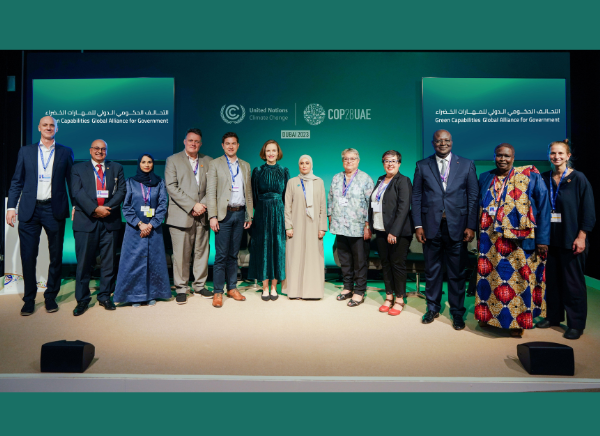
The UAE Government has introduced the Green Capabilities Global Alliance for Government, aimed at addressing climate change challenges across the globe. Ohood bint Khalfan Al Roumi, Minister of State for Government Development and the Future, emphasized the impact of climate change on social and economic sectors during the COP28-UAE roundtable on “Building climate capable governments.” The event, organized by the Government Development and the Future Office in collaboration with Apolitical, the Bezos Earth Fund, and C40 Cities, also marked the launch of the alliance.
Al Roumi stressed the importance of acquiring new skills to bridge the green government skills gap, fostering sustainable practices across all sectors. The Green Capabilities Global Alliance for Government is a collaborative effort between the UAE government and Apolitical to support governments in upskilling employees for environmental sustainability and climate change resilience. Recognizing the critical role of government employees in shaping climate policies, the alliance aims to integrate climate and environmental skills into government skilling programs globally.
“The Green Capabilities Global Alliance for Government is a global platform that unites cooperation efforts aiming to close the green skills gap globally by enabling Alliance member governments to integrate climate and environmental skills into their government skilling programs,” commented Al Roumi. The UAE government has already taken significant steps in this direction by launching the sustainability track “Jahiz,” focusing on climate change, net zero, and the circular economy. Over 50,000 UAE government employees have undergone mandatory training, earning more than 250,000 badges in green skills.
During the roundtable, participants highlighted the need for governments to lead climate change efforts and discussed experiences in training government employees on green skills. Andrew Steer, President and CEO of the Bezos Earth Fund, emphasized the crucial role of government capabilities in addressing climate change and urged NGOs to support governments in expanding climate-related training. Pledges from various governments, including the USA, UK, Brazil, South Africa, and Canada, demonstrated a commitment to investing in green skills for their workforce.
Robyn Scott, CEO and co-Founder of Apolitical, stressed the urgency of closing the government “green skills gap,” citing Apolitical’s 2023 global Government Green Skills Survey. Concrete pledges were made, including South Africa’s initiative to introduce climate and sustainability training for new government employees, the commitment of Tshwane’s Mayor to embed climate budget considerations, and the African Capacity Building Foundation’s pledge to provide climate and nature skills to civil servants across Africa.
Debbie Palmer from the FCDO, UK, emphasized the need to involve diplomatic personnel in climate and nature skills action, while Sandra Mccardell from Environment and Climate Change Canada pledged climate literacy training for 30,000 federal public servants. Mayor Mike Savage from the Halifax Regional Municipality announced the implementation of HalifACT, a comprehensive climate mitigation and adaptation plan, including mandatory new training in 2024 and a governance model to drive climate action across the organization.